Unit 2 I'll help to clean up the city parks-Section B 2a-2e课件(共19张PPT)
文档属性
| 名称 | Unit 2 I'll help to clean up the city parks-Section B 2a-2e课件(共19张PPT) | 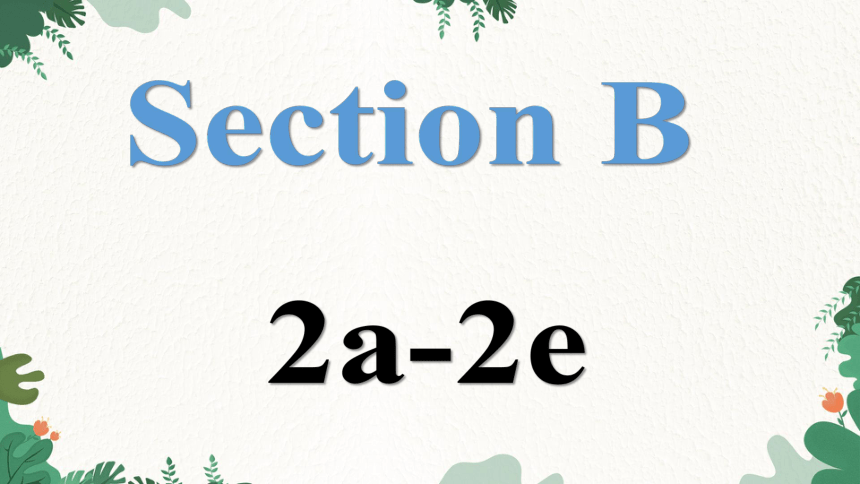 | |
| 格式 | pptx | ||
| 文件大小 | 3.9MB | ||
| 资源类型 | 教案 | ||
| 版本资源 | 人教新目标(Go for it)版 | ||
| 科目 | 英语 | ||
| 更新时间 | 2023-07-02 10:24:56 | ||
图片预览

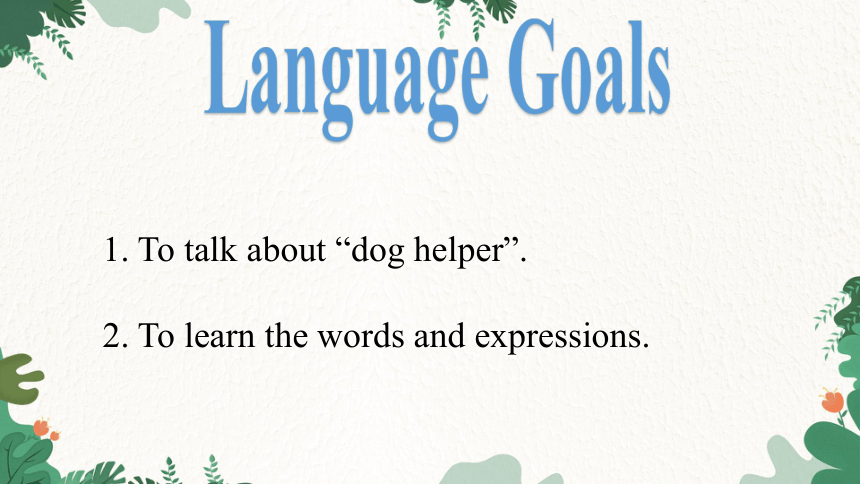
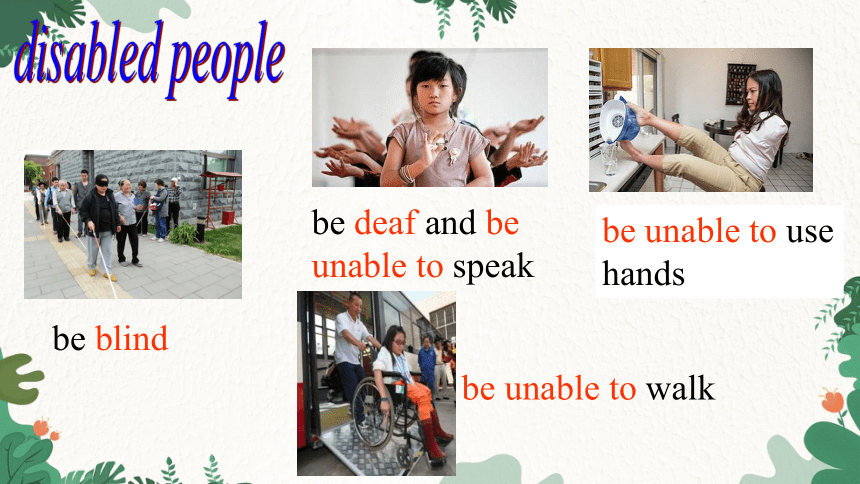
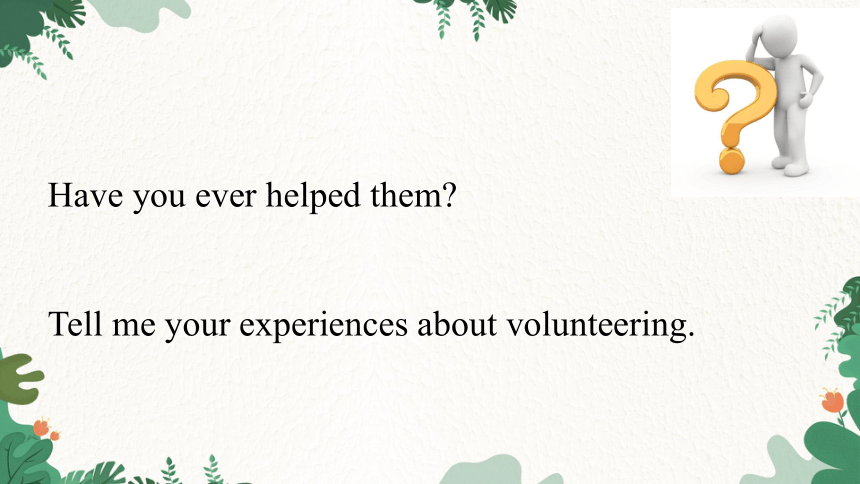
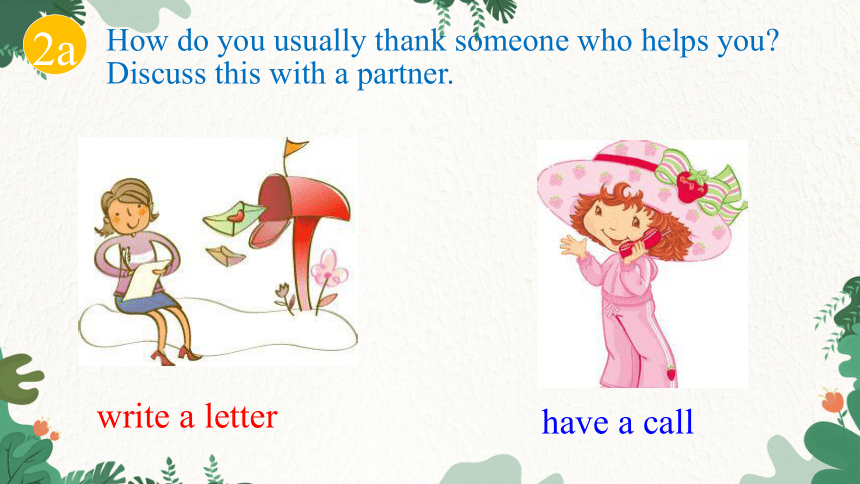
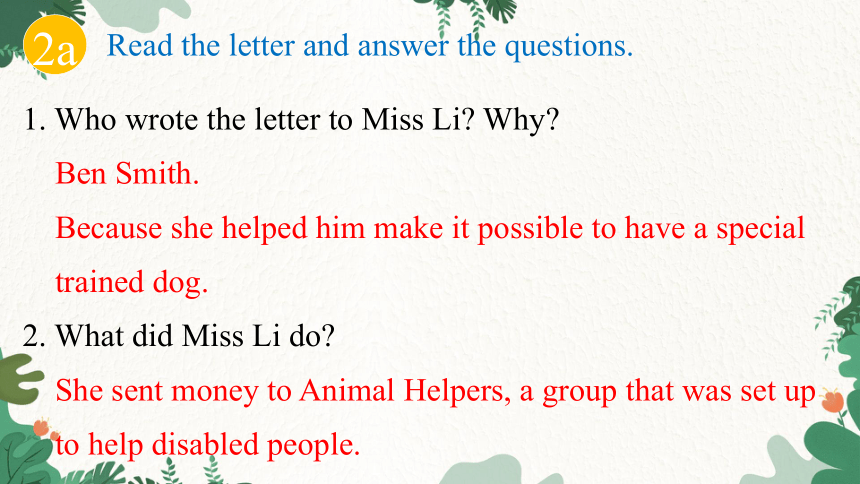
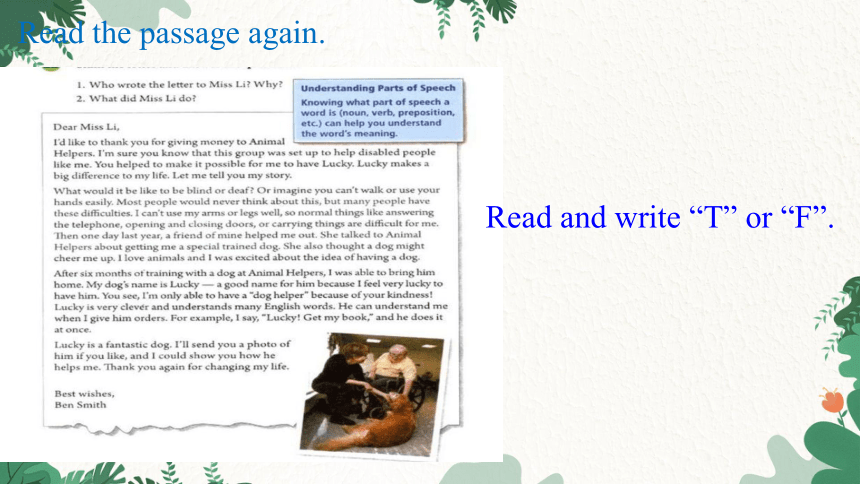
文档简介
(共19张PPT)
Section B
2a-2e
1. To talk about “dog helper”.
2. To learn the words and expressions.
Language Goals
be blind
be deaf and be unable to speak
be unable to use hands
be unable to walk
disabled people
Have you ever helped them
Tell me your experiences about volunteering.
How do you usually thank someone who helps you
Discuss this with a partner.
have a call
write a letter
2a
Read the letter and answer the questions.
2a
1. Who wrote the letter to Miss Li Why
Ben Smith.
Because she helped him make it possible to have a special
trained dog.
2. What did Miss Li do
She sent money to Animal Helpers, a group that was set up
to help disabled people.
Read the passage again.
Read and write “T” or “F”.
Read and write “T” or “F”.
1. The writer can’t use her arms or legs well.
2. Lucky was brought to the writer by her friend.
3. They have been trained at “Animal helpers” for seven months.
4. A dog-helper is for those who are disabled.
5. Lucky can understand different orders.
T
F
F
T
T
1. I’m sure you know that this group was set up to help disabled
people like me.
(1) set up 意为“建起;设立”。
·A fund will be set up for the dead men’s families.
抚恤死难工人家属的基金会即将建立起来。
(2) disabled 意为“丧失能力的;有残疾的”,既可以做表语也
可以做定语。
·Now that he was disabled, his house had become a prison to him.
因为他残废了,他的房子就成了他的牢笼。
Language points
2. Lucky makes a big difference to my life.
make a difference意为“影响;有作用”。
·Does his absence make a difference to your work
没有他,会影响你的工作吗
·This should not make a difference for most users.
对于大多数用户,这并没有影响。
Language points
3. What would it be like to be blind or deaf
(1) blind是形容词,意为“瞎的;失明的”, 在句中可用作定语、
主语补足语或宾语补足语。
·Without his spectacles, he is as blind as a bat.
没有眼镜,他是几乎全盲的。
(2) deaf 是形容词,意为“聋的”时可用作定语和表语, deaf前加
定冠词可作名词使用,表示一类人。
表示哪只耳朵聋,deaf 后接介词in引导的短语。
“聋和哑”: deaf and dumb;
“聋哑人”:deaf-mute或deaf mute。
Language points
4. Or imagine you can’t walk or use your hands easily.
imagine意为“想象;设想”, 是及物动词, 其主语一般是表示
人的名词或代词。imagine一般不用于进行时,可用于被动结构。
·You can imagine how surprised I was.
你可以想象我是多么惊讶。
·I can’t imagine living without friends.
我无法想象离开朋友如何生活。
·I can’t imagine what Noah had in mind.
我猜不出挪亚脑子里想的是什么。
Language points
5. She talked to Animal Helpers about getting me a special trained
dog.
她跟“动物助手”谈过后让我得到了一只受过特殊训练的狗。
(1) train是动词, 意为“训练;培训”, 用作及物动词时, 接名词、代词作宾语。还可接以“(as/to be) n./adj. ”或动词不定式充当补足语的复合宾语。train sb. to do sth. 表示“训练某人去做某事”。 另外,train也可以与介词for连用,表示“为……而进行训练”。
(2) training是名词,意为“训练;培训”, training表示“训练;受训”, 用作不可数名词。training有时可用作定语。
Language points
6. Lucky is very clever and understands many English words.
(1) clever是形容词,意为“聪明的;聪颖的”, clever在句中
可用作定语、表语或补语。 clever 前可用very 修饰。其比较
级为 cleverer, 最高级为 cleverest。
(2) understand是动词,意为“理解;领会”,其过去式是
understood;可用作不及物动词,也可用作及物动词。用作及
物动词时,可接名词、代词、动名词、带疑问词的动词不定
式、that从句及疑问词从句作宾语, 还可接以“to be+ n./adj. ”
或动词不定式充当补足语的复合宾语。
Language points
Look at the list of words below. Circle the part of speech of each word and make your own sentences with these words.
1. group (adj./n.) ___________________________________
2. disabled (adj./adv.) _______________________________
3. difference (adv./n.) _______________________________
4. imagine (v./ n.) __________________________________
5. difficulties (n./ adj.) ______________________________
6. normal (adv./ adj.) _______________________________
7. training (adv./n.) _________________________________
8. kindness (n./ v.) __________________________________
2c
I was in another group.
He was born disabled.
There’s no difference in the results.
Can you imagine life without tears
We still face very serious difficulties.
Her temperature is normal.
He does a lot of weight training.
Thank you for your kindness.
Use information in the letter to make
true sentences by matching the different parts.
2d
SUBJECT
Miss Li
Ben Smith
Lucky
Animal Helpers
VERB
can get
trains
sent
wrote
OBJECT
a letter to Miss Li.
money to Animal Helpers.
animals like Lucky.
things for disabled people.
Discuss the questions with a partner.
1. In what other ways do you think dogs are able to help people
2. What other animals can we train to help people
2e
1. David Burt’s dream in China is to go into the west and ______
an early childhood school there.
A. clean up B. look up C. give up D. set up
2. If _____, how can a child enjoy the happiness of life
A.being born blind and deaf B.born to be blind and deaf
C.being blind and deaf D.born blind and deaf
3.-Dear, what about going to the beaches for vacation
-Great! _______we’ re lying on the beach in the sun, enjoying
music. It must be great fun!
A. Pretend B.Promise C. Mention D. Imagine
1.Write a letter to the place you want to volunteer
at after class.
2.Retell the story about Lucky.
Section B
2a-2e
1. To talk about “dog helper”.
2. To learn the words and expressions.
Language Goals
be blind
be deaf and be unable to speak
be unable to use hands
be unable to walk
disabled people
Have you ever helped them
Tell me your experiences about volunteering.
How do you usually thank someone who helps you
Discuss this with a partner.
have a call
write a letter
2a
Read the letter and answer the questions.
2a
1. Who wrote the letter to Miss Li Why
Ben Smith.
Because she helped him make it possible to have a special
trained dog.
2. What did Miss Li do
She sent money to Animal Helpers, a group that was set up
to help disabled people.
Read the passage again.
Read and write “T” or “F”.
Read and write “T” or “F”.
1. The writer can’t use her arms or legs well.
2. Lucky was brought to the writer by her friend.
3. They have been trained at “Animal helpers” for seven months.
4. A dog-helper is for those who are disabled.
5. Lucky can understand different orders.
T
F
F
T
T
1. I’m sure you know that this group was set up to help disabled
people like me.
(1) set up 意为“建起;设立”。
·A fund will be set up for the dead men’s families.
抚恤死难工人家属的基金会即将建立起来。
(2) disabled 意为“丧失能力的;有残疾的”,既可以做表语也
可以做定语。
·Now that he was disabled, his house had become a prison to him.
因为他残废了,他的房子就成了他的牢笼。
Language points
2. Lucky makes a big difference to my life.
make a difference意为“影响;有作用”。
·Does his absence make a difference to your work
没有他,会影响你的工作吗
·This should not make a difference for most users.
对于大多数用户,这并没有影响。
Language points
3. What would it be like to be blind or deaf
(1) blind是形容词,意为“瞎的;失明的”, 在句中可用作定语、
主语补足语或宾语补足语。
·Without his spectacles, he is as blind as a bat.
没有眼镜,他是几乎全盲的。
(2) deaf 是形容词,意为“聋的”时可用作定语和表语, deaf前加
定冠词可作名词使用,表示一类人。
表示哪只耳朵聋,deaf 后接介词in引导的短语。
“聋和哑”: deaf and dumb;
“聋哑人”:deaf-mute或deaf mute。
Language points
4. Or imagine you can’t walk or use your hands easily.
imagine意为“想象;设想”, 是及物动词, 其主语一般是表示
人的名词或代词。imagine一般不用于进行时,可用于被动结构。
·You can imagine how surprised I was.
你可以想象我是多么惊讶。
·I can’t imagine living without friends.
我无法想象离开朋友如何生活。
·I can’t imagine what Noah had in mind.
我猜不出挪亚脑子里想的是什么。
Language points
5. She talked to Animal Helpers about getting me a special trained
dog.
她跟“动物助手”谈过后让我得到了一只受过特殊训练的狗。
(1) train是动词, 意为“训练;培训”, 用作及物动词时, 接名词、代词作宾语。还可接以“(as/to be) n./adj. ”或动词不定式充当补足语的复合宾语。train sb. to do sth. 表示“训练某人去做某事”。 另外,train也可以与介词for连用,表示“为……而进行训练”。
(2) training是名词,意为“训练;培训”, training表示“训练;受训”, 用作不可数名词。training有时可用作定语。
Language points
6. Lucky is very clever and understands many English words.
(1) clever是形容词,意为“聪明的;聪颖的”, clever在句中
可用作定语、表语或补语。 clever 前可用very 修饰。其比较
级为 cleverer, 最高级为 cleverest。
(2) understand是动词,意为“理解;领会”,其过去式是
understood;可用作不及物动词,也可用作及物动词。用作及
物动词时,可接名词、代词、动名词、带疑问词的动词不定
式、that从句及疑问词从句作宾语, 还可接以“to be+ n./adj. ”
或动词不定式充当补足语的复合宾语。
Language points
Look at the list of words below. Circle the part of speech of each word and make your own sentences with these words.
1. group (adj./n.) ___________________________________
2. disabled (adj./adv.) _______________________________
3. difference (adv./n.) _______________________________
4. imagine (v./ n.) __________________________________
5. difficulties (n./ adj.) ______________________________
6. normal (adv./ adj.) _______________________________
7. training (adv./n.) _________________________________
8. kindness (n./ v.) __________________________________
2c
I was in another group.
He was born disabled.
There’s no difference in the results.
Can you imagine life without tears
We still face very serious difficulties.
Her temperature is normal.
He does a lot of weight training.
Thank you for your kindness.
Use information in the letter to make
true sentences by matching the different parts.
2d
SUBJECT
Miss Li
Ben Smith
Lucky
Animal Helpers
VERB
can get
trains
sent
wrote
OBJECT
a letter to Miss Li.
money to Animal Helpers.
animals like Lucky.
things for disabled people.
Discuss the questions with a partner.
1. In what other ways do you think dogs are able to help people
2. What other animals can we train to help people
2e
1. David Burt’s dream in China is to go into the west and ______
an early childhood school there.
A. clean up B. look up C. give up D. set up
2. If _____, how can a child enjoy the happiness of life
A.being born blind and deaf B.born to be blind and deaf
C.being blind and deaf D.born blind and deaf
3.-Dear, what about going to the beaches for vacation
-Great! _______we’ re lying on the beach in the sun, enjoying
music. It must be great fun!
A. Pretend B.Promise C. Mention D. Imagine
1.Write a letter to the place you want to volunteer
at after class.
2.Retell the story about Lucky.
同课章节目录
- Unit 1 What's the matter?
- Section A
- Section B
- Unit 2 I'll help to clean up the city parks.
- Section A
- Section B
- Unit 3 Could you please clean your room?
- Section A
- Section B
- Unit 4 Why don't you talk to your parents?
- Section A
- Section B
- Unit 5 What were you doing when the rainstorm came
- Section A
- Section B
- Review of Units 1-5
- Unit 6 An old man tried to move the mountains.
- Section A
- Section B
- Unit 7 What's the highest mountain in the world?
- Section A
- Section B
- Unit 8 Have you read Treasure Island yet?
- Section A
- Section B
- Unit 9 Have you ever been to a museum?
- Section A
- Section B
- Unit 10 I've had this bike for three years.
- Section A
- Section B
